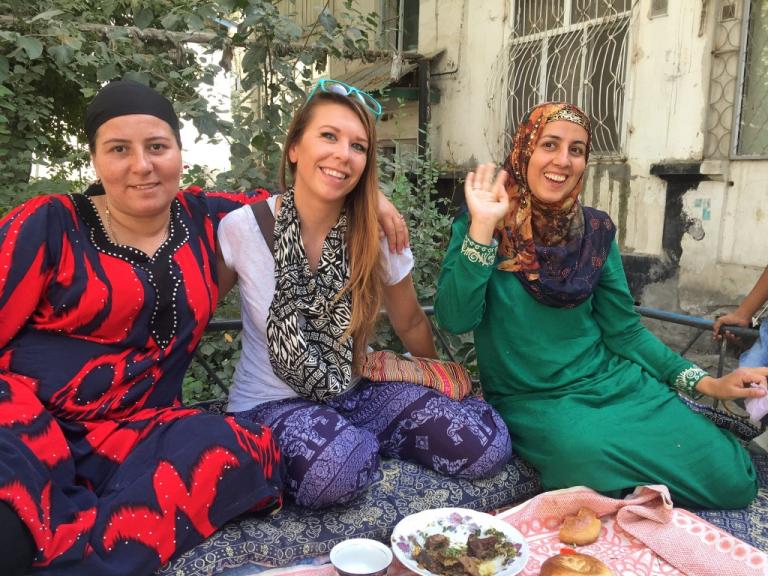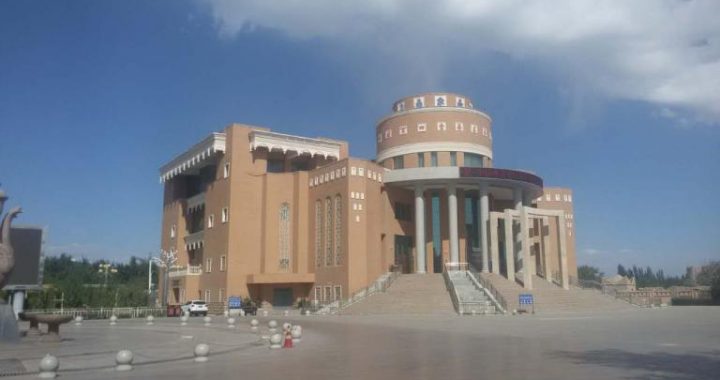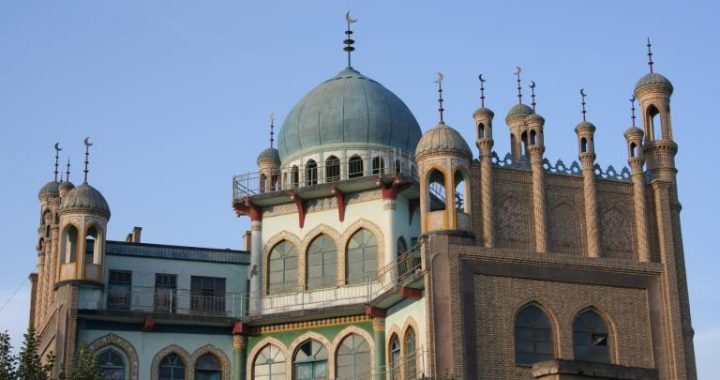Friends from afar
11 min readThe Uygur,the Kazak,the Kirgiz and the tajik are famous for their hospitality.If guests are coming,they will step out to welcome the guests regardless of whether they are acquainted or not.they express their warm reception and take the best food for the guests to eat,and if the guests stay for the night,the best bedclothes will be supplied to them.With regard to distinguished guests and relatives from afar,the relatives,friends and neighbors will treat them warmly in turn,slaughtering sheep or horses and cooking boiled lamb to entertain them.They always see off the guests outside the door when the guests leave.

The Uygur ethnic groupis honest and hospitable, attaching importance to the etiquette of entertaining the guests. Whether the guests are known or unknown, they will be warmly welcomed by the host as long as they visit the Uygur people. After the guests come into the room, the hostess will prepare a cotton-padded mattress for them instantly and invites them to take a seat on it for showing the respect to them If the hostess knows the visit of the guests in advance, she will prepare the cotton-padded mattress early. There are food and cotton-padded mattress prepared in each Uygur family at any time for entertaining the guests and the best things of the family are provided for the guests to eat once they come. As the saying goes, the table in Uygur home is never empty. After the guests take the seat, the host brings a hand washingpot and a hand washing basin to let them clean hands. then the host paves a piece of tablecloth in front of the guests to put various candies and naans, and then provides steaming and mellow milk tea or green tea by both hands. Even if there are only boiled water and corn naans, the host also takes them out to entertain the quests; otherwise the host will feel a lack of respect to the guests. The naan is necessary among the food used for entertaining the guests. Naan is the best food in the view of the Uygur people, so it is the most precious food for entertaining the guests. If visiting the Uygur in summer orautumn full of mellow fruitfulness, you’ ll see that not only the naan and the tea, but also watermelons with red mushy flesh or muskmelons with pink flesh or green flesh are placed in front of you. If you have a visit in rural areas, the honest and hospitable Uygur farmers will offer you various fruits to let you enjoy them. When it’s late for the guests to leave, the hospitable host always persuades the guests to stay at his home; and the best bedclothes are provided for the guests who will stay for the night. Each Uygur family has standby bedclothes. The next morning, the host gets up early to prepare breakfast for the guests; and when the guests leave, the host sees off the guests outside the door, wishing the guests safe and begging Allah to bless them. If the distinguished guests and the relatives from afar come, qualified families will slaughter a sheep to warmly entertain them, while the families under a slightly poor condition will at least slaughter one chicken to entertain the guests with rich food. If guests come to a family, the relatives, friends and neighbors will entertain them in turn Even if the guests after eating the meal pay a visit at the meal time, the host will also hospitably invite them to have the dinner together with his family.

The Uygur are particular about the etiquette of entertaining the guest and being the guest. The women do not bring the meal to a male guest directl but her husband brings it to him, since the female generally does not expose her face. a female guest will not have the meal together with the male guest at the same table. The male guest is entertained by the host, while the femaleone is entertained by the hostess. When the guests are entertained at home, the elder or the distinguished guest is invited to be seated at the head of the table near the fireplace when the elder or the distinguished quest enters th room, the young should stand up and express greetings to them before taking the seat; and people are required to sit on heels when they are on a heatable brick bed. the guests should accept a gift or the tea from the host by both hands, because accepting articles by one hand is impolite
The Kazak ethnic grouphas many proverbs about the manner of dealing with people, such as”The half of the property left by the parents belongs to the guests”, “The one stingy to feed the horse will walk sooner or later; and the one stingy to generously entertain the guests will encounter starvation sooner or later “, and When a good guest comes, two lambs shall be used”. From these proverbs, we can easily see that the Kazak is also a hospitable ethnic group. In pastoral areas, the host will walk out the yurt to warmly welcome you if you come to front of the Kazak yurt. For an elderly guest, the host will help the guest to dismount, hitch and feed the horse and then welcome the guest into the yurt and hang up the guest’s hat and whip If the distinguished guest is in presence, the host’s wife, children and daughter-in-law will stand side by side to bow and salute to the guest. After the guest takes the seat, the guest and the host greet to each other. If many guests are coming at the same time, they take the seat according to the age. The distinguished and elderly guest sits at the head of the table the rest guests sit on the right according to the age, and he families of the host sit on the left according to the age. according to the custom, the males sit cross-legged, and the females sit on heels. Then, the hostess spreads a tablecloth in front of the guests, on which, characteristic foods such as the naan, butter, steamed stuffed buns, crystallized milk, dried milk curd and cube sugar are placed, and offers the milky tea to the guests. Ir summer, the host treats the distinguished guests with “Kizim”(Mare’s Milk while in winter, the host treats the guests with “Dzent”(prepared by stirringmillet, sugar and mutton fat). The host persuades the guest to stay again and again when the guest is leaving. If the guest has to leave, the host will lead the horse, arrange the saddle and help the guest to mount the horse. the Kazak people do not let the guests leave when the sun is setting for that they think it is a burning shame to let the guests leave when the sun is setting. They usually slaughter a sheep to treat the staying guests and slaughter a foal about two years old to treat the distinguished guests from afar. The sheep and the horses are strong especially in summer and autumn, and it is a common custom to slaughter the horse and the sheep to entertain the guests. Slaughtering the sheep to entertain the guests is known in the Kazak language as”Konak ase with a unique custom. The host leads the sheep into the yurt, kneeling on the ground by the right leg in front of the guests, embracing the neck of the sheepby his right arm, raising his double hands to the chest and respectfully saying to the guests, “Please permit”(words asking for blessing). At this time, all the guests in presence raise their hands, and the elderly guest among the guests
makes “Bata”(blessings): wish a happy family flourishing men and livestock, the son being a hero and the daughter being an Aken. And then the sheep is pulled out from the yurt to be slaughtered and stewed in clear soup. Usually, the host does not slaughter black sheep, but slaughter yellow-head ones. At of cheek meat for the elder in presence, one sheep ear for the youngest in e the meal, the sheep head is offered to the guest firstly. the guest cuts a pi presence and a piece of meat for himself, and then he returns the sheep head to the host. And then, they start to enjoy the meat. Distributing 12 bones and meat in other portions of the sheep to what kind of the guests has certain rules: the sheep head and the meat of the buttocks are offered to the elderly and distinguished guests, the meat with anklebones and the breast meat are offered to the son-in-law and the daughter-in-law, and the tongue, the ears, the kidney and the heart of the sheep are offered to the children.
My guests from afar, Well cooked mutton has been prepared for you Because you’ re coming, I’ ll hospitably entertain you! My guests from afar, thick bedclothes have been prepared for you. Because you’ re coming, I’ ll make up a few songs to praise you! “This “Hospitable Song”shows a scene of entertaining the guests in the Khalkhas. The Khalkhas are also particular about the etiquette of entertaining the guests. When the guests come to the door, all the families walk out to welcome the guests with males standing on the right side of the door and females standing on the left. If the guest rides a horse to come the host will come up to help the guest to dismount and then welcome the guest into the house. It indicates that the guest will stay for the night if the guest hands over his whip to the host. It is said that the custom of slaughtering the foal to entertain distinguished guests derives from the Manas Era. the hero manas united each tribe of his own ethnic groupand other ethnic groups to fight against the enemy. In order to thank the coming of all the heroes, Manas slaughtered the fattest foal in the horse group and the strongest white camel lamb in the camel group. At the banquet, Manas extemporaneously sung a song to welcome the distinguished guests: “Honored guests come to the khalkhas grassland, and you’ re the guests unable to be invited by entertaining with slaughtering foals; honored guests support therighteous cause, and you’ re the guests unable to be invited by entertainingwith the camel lambs.”Since then, the custom of slaughtering the foals and the camel lambs to entertain the honored guests has been handed down.
In the Pamirs, there is a proverb: “Whoever has the privilege to be the guest of the tajik ethnic group, he will receive the most enjoyable entertainment The etiquette of entertaining the guests in the Tajik ethnic groupis pristine and cordial. When the guest rides the horse to come to the door of the host, thehost helps the guest to dismount and takes over the whip at the same time of welcoming the guest. The tajik people are proud of guest’s arrival or accommodation. It indicates that the guest will lodge at the host’s home if he hands over his whip to the host. the hostess paves the cotton-padded mattress for the guest, and then stacks up a pillow for the guest and helps the guest to take off his shoes after the guest takes his seat. the guest and thehost greet to each other, and then the host will entertain the guest with the best food at home. If the guest stays for the night, the host will prepare a rich dinner. The close relatives and good friends are entertained with slaughtered sheep The Tajik people regard the sheep head as the top grade”of the whole sheep. When the mutton is offered, the sheep head is placed in front of the guest for respect, and others cannot eat the sheep head casually In the process of eating the mutton, the guest should take some mutton from the plate to return to the hostess, and he will be considered disrespectful if not Before going to sleep, the hostess should make the bed for the guest. Theproverb in the Tajik ethnic groupsays that “Don’t open the luggage of the guest and don ‘t ask the leaving time of the guest When the guest leaves, the host prepares the horse for the guest, leading the horse to the door helping the guest to ride the horse, returning the whip and saying goodbye to the guest.f
The Xibe is also a hospitable ethnic group Respecting the guests is themost important one in the national etiquette. the host must walk out to welcome the guest when the guest is coming, and see off the guest outside the yard gate when the guest is leaving. An arrived guest from afar is not allowed to leave with an empty stomach. The host must prepare a good meal for the guest and allow the guest to leave only after the guest is full. When the guest is having the dinner, the host should not make noise of a spatula; otherwise, the guest may think that the food is not enough. Don ‘t fiddle with the belongings such as the luggage and the hat of the guest, and the belongings should be placed at a high place. Don’t ask the leaving time of the guest. If the guest stays for the night, the husband and the wife at the host’s home can’t sleep together, and one of them should company the guest; otherwise, the host may be considered to be impolite or disrespectful to the guests. When the guest is at home, other family members of the host also should be polite tothe guest, and should not casually lie down in front of the guest. When the host is communicating with the guest, the younger should not casually interrupt the communication or listen aside.
The milky tea and green tea are the most important drinks in daily lives of Xinjiang minorities and there is a parlance that “i would rather have no food for a whole day than have no tea. So it is an important custom for Xinjiang minorities to treat guests with tea. Even in seasons full of fruits fragrance, they will give guests a bowl of hot tea. If you have drunk off a whole bowl of tea, the hospitable host will fill up the bowl at once. If the guest does not want tea any more he should cover the mouth of bowl with hand otherwise the host will continue to fill up the bowl. There are many particular customs for making pouring and serving tea in Uygur. When pouring tea for guests, the host raises the teapot with right hand to make the tea water flow into the bowl along itsedge slowly, avoiding the splashing droplets or froth or too full a bowl. the host should get ready to pour water for guests at all times in order to let guests drink hot tea at any time. the host should give tea to guest with both hands, and the guest also should accept the tea with both hands. If the guest’ stea water is cool, the host will substitute hot tea for it. there are also many rules for the tea set and tableware of which the common families usually haveone or two sets in Uygur. They also prepare a set of tea set particularly for guests. In the language of some ethnics such as Uygur and Kazak, the word not only refers to tea leaf and tea water but also to breakfast eatin desserts, dining and gathering and so on, even some rituals such as kiqik qay (to contract a marriage) and gong gay(engagement)









